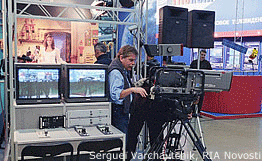Media Pressured Before Elections

file photo of random Russian television studioAs Sunday's State Duma vote draws near, the plot thickens.
A string of incidents this week has led observers to believe that the Kremlin is extremely nervous about the waning popularity of the country's leaders, manifested in dwindling support for their party, United Russia. As latest polls suggest that the all-dominant party might slide from a two-thirds to a mere simple majority in parliament, a string of scandals has hit national media outlets, prompting one international advocacy group to condemn an "avalanche of arbitrary censorship."
Reporters Without Borders said Thursday that it compiled a list of recent freedom of information violations that shows "that no methods are being spared to bolster strongman Vladimir Putin and promote unanimous acclaim for his decision to run again for the presidency."
The most telling example is the crackdown on Golos, the country's only independent elections observer organization, which became the target of a concerted campaign by authorities and certain media this week.
This Friday night, Gazprom-controlled television channel NTV, will air a 30-minute investigative piece on Golos, questioning the organization's objectivity on grounds that it is financed by U.S. grants.
On Wednesday, an editor of Gazeta.ru resigned after a link to an interactive map with elections violations was removed from the leading news portal. The editor, Roman Badanin, complained that Gazeta.ru's owners had removed the link and were unhappy with the election coverage he had supervised. The map, Kartanarusheniy.ru, was initiated by Golos.
On Thursday, city prosecutors warned the association against breaking the law and ordered a district court to decide whether to open a case for administrative violations.
Other incidents this week include censorship accusations against RIA-Novosti, the country's biggest state-owned news agency, and fresh denial-of-service attacks against LiveJournal, the country's biggest blogging platform.
RIA-Novosti, however, vehemently denied the claim by Grigory Okhotin, a former freelancer, who leaked an e-mail in which agency editors appear to order him not to post articles hostile of United Russia and its leader, Prime Minister Vladimir Putin, on the Inosmi.ru site, which translates foreign media reports into Russian.
The agency said in an e-mailed statement Tuesday that the editors had merely reminded all staff, including Okhotin, not to publish "imbalanced" articles in the run-up to the elections.
Among the odder incidents was attack on the web site of Kommersant, the influential daily, which during much of Thursday only showed an image of a bleeding polar bear United Russia's mascot cruelly impaled on a Kremlin spire.
Around it was a blaring slogan calling for people to gather on Pushkin Square on Sunday evening to protest against "falsified elections."
Kommersant publisher Demyan Kudryavtsev blamed unidentified hackers for the incident but refused to speculate who was behind it. "I have neither time nor inclination to deal with this criminal activity," he was quoted as saying by Lenta.ru.
Wherever the truth in this and other cases, United Russia officials openly admit that they are increasingly losing in public opinion more than before the last Duma elections 2007.
Sergei Markov, a United Russia Duma deputy and long-time Kremlin-connected spin doctor, said that the Kremlin is losing control over the media.
"The country's quality media have defected to the opposition," he said by telephone Thursday.
He argued that opposition views dominated most of the capital's radio stations and newspapers. "Komsomolskaya Pravda and Izvestia are the only ones that keep a balance," he said.
Markov admitted that this was not necessarily the case with national television.
Experts agree that firm state control over the country's three major channels and most regional TV stations remains the backbone of the government's sway over the media because most Russians still rely on television as the main source of political information.
United Russia has dominated the airwaves with about 60 percent of the time given to political ads, far surpassing the time allotted to all the other parties combined, opposition leader Vladimir Ryzhkov said. (See related story, Page 9.)
But Markov argued that, apart from evening news programs, here too change was in the making.
"I participated in talk shows on NTV that were dominated by oppositional spirit," he said.
However, Markov also appears in the NTV trailer for Friday's Golos report, in which he claims that the organization "works under direct political orders" presumably from the United States.
He defended the crackdown on Golos by warning that the organization might be part of an opposition plot to let election day end in violence similar to the riots after the presidential election in Belarus one year ago.
"Maybe they are really part of preparations for a 'Minsk Scenario,'" he said.
Alexander Lukashenko, Belarus' authoritarian president, has accused opposition activists of provoking the riots, but opposition members have claimed that agent provocateurs from the Belarussian KGB might be behind them.
While Markov's analysis is hardly shared by independent observers, many analysts agree that the rise of the Internet has made the situation much more difficult for authorities.
A recent survey said the country has 51 million Internet users, more than any other nation in Europe. And a quarter of respondents said they get most of their news online.
"The overall picture has changed dramatically over the past four years," said Konstantin von Eggert, a political commentator who regularly appears on Kommersant FM radio and writes a column for RIA-Novosti.
Von Eggert argued that especially in bigger cities debates have started to feed from LiveJournal, Twitter and other web forums to television and into real politics.
"Formerly, if something was not on TV, it did not exist. Today, even national TV cannot ignore them," he said.
Vladimir Pribylovsky, head of the Panorama think tank, said the Kremlin so far lacks a strategy to influence opinion on the Internet.
"All the pro-Kremlin web sites combined have less of an audience than Navalny's blog," he said, referring to anti-corruption crusader Alexei Navalny.

